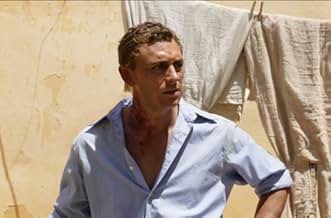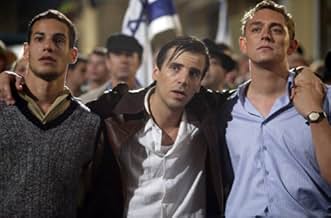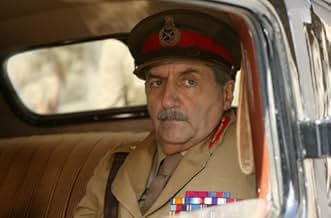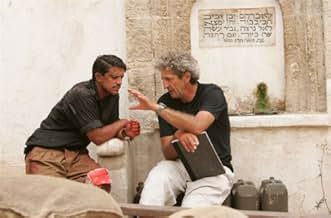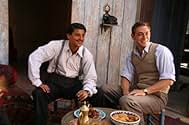Un cuento sobre la amistad entre dos hombres, uno judío y otro árabe, durante el nacimiento del estado de Israel.Un cuento sobre la amistad entre dos hombres, uno judío y otro árabe, durante el nacimiento del estado de Israel.Un cuento sobre la amistad entre dos hombres, uno judío y otro árabe, durante el nacimiento del estado de Israel.
- Dirección
- Guionistas
- Elenco
Mhairi Morrison
- Cathy
- (as Mhairi Steenbock)
- Dirección
- Guionistas
- Todo el elenco y el equipo
- Producción, taquilla y más en IMDbPro
Opiniones destacadas
I enjoyed this film and I'm going to review it instead of discussing the pros and cons of Israel/Palestine.
I saw it at Cinema Sundays at the Charles, here in Baltimore MD USA.
In the interest of full disclosure, I am not Jewish, and I am anti-Israel and pro-Palestine.
At Cinema Sundays, the host is Jewish, and this week's discussion leader is also Jewish -- I think I'm safe in saying it's a largely Jewish group which goes to Cinema Sundays and attended this screening. Although a show of hands said that more liked it than disliked it, the host and discussion leader didn't like it at all --- the discussion leader had even skipped the pre-screening the day before -- his reason seemed to boil down to he had better things to do.
The discussion was largely (but not all) panning the film.
I thought (with one glaring exception, which I won't reveal here) that the movie was balanced, while telling the story primarily from the Jewish side. In the foreground, it concerns an American Jew and an Arab Palestinian who meet in the U.S. and become friends. Each finds himself going to Palestine in 1947, knowing that a conflict is coming, a struggle for control of the land. The story of these two men and their friends and lovers is in the foreground, and in the background is the story of the British leaving Palestine, and the U.N. vote for partition.
There's a fair amount of violence, sudden, unexpected violence realistically portrayed. However, there's no enjoyment of the mayhem, and but little glorification of it.
I felt well-informed by the movie in terms of its telling of the story of the birth of Israel. I think this is good story-telling -- although, of course, the two main characters keep encountering each other even after they split up - well, duh, it's a movie about these two characters! :o) A little cinematic license. There's a very touching and emotional scene near the end which had me riveted.
I think the story is told relatively objectively (which is to say, more objectively than, say, 90% of news coverage here in the USA, which overwhelmingly favors Israel) while holding out hope for reconciliation between Arabs and Jews in Israel/Palestine. And, I have to say, I think that's why so many people at Cinema Sundays disliked the movie, without really being able to articulate why ("I've seen this all before, oversimplified, unlikely...") -- because it was objective and told the Arab side, and portrayed the Palestinians as human beings who suffered in the partition.
I give it an 8 because of the one pulled punch, which I thought destroyed the balance of the film. I'll discuss that on the Message Boards, as I don't want to Spoil the movie.
I saw it at Cinema Sundays at the Charles, here in Baltimore MD USA.
In the interest of full disclosure, I am not Jewish, and I am anti-Israel and pro-Palestine.
At Cinema Sundays, the host is Jewish, and this week's discussion leader is also Jewish -- I think I'm safe in saying it's a largely Jewish group which goes to Cinema Sundays and attended this screening. Although a show of hands said that more liked it than disliked it, the host and discussion leader didn't like it at all --- the discussion leader had even skipped the pre-screening the day before -- his reason seemed to boil down to he had better things to do.
The discussion was largely (but not all) panning the film.
I thought (with one glaring exception, which I won't reveal here) that the movie was balanced, while telling the story primarily from the Jewish side. In the foreground, it concerns an American Jew and an Arab Palestinian who meet in the U.S. and become friends. Each finds himself going to Palestine in 1947, knowing that a conflict is coming, a struggle for control of the land. The story of these two men and their friends and lovers is in the foreground, and in the background is the story of the British leaving Palestine, and the U.N. vote for partition.
There's a fair amount of violence, sudden, unexpected violence realistically portrayed. However, there's no enjoyment of the mayhem, and but little glorification of it.
I felt well-informed by the movie in terms of its telling of the story of the birth of Israel. I think this is good story-telling -- although, of course, the two main characters keep encountering each other even after they split up - well, duh, it's a movie about these two characters! :o) A little cinematic license. There's a very touching and emotional scene near the end which had me riveted.
I think the story is told relatively objectively (which is to say, more objectively than, say, 90% of news coverage here in the USA, which overwhelmingly favors Israel) while holding out hope for reconciliation between Arabs and Jews in Israel/Palestine. And, I have to say, I think that's why so many people at Cinema Sundays disliked the movie, without really being able to articulate why ("I've seen this all before, oversimplified, unlikely...") -- because it was objective and told the Arab side, and portrayed the Palestinians as human beings who suffered in the partition.
I give it an 8 because of the one pulled punch, which I thought destroyed the balance of the film. I'll discuss that on the Message Boards, as I don't want to Spoil the movie.
That, oh so poignant verse from Psalm 137 altogether sums my impressions of the film. By all means, I am kind with my assessment. This should have been a great film, provided, the Hollywood script writers followed the book's theme. Alas, they did not; what else is new under the sun!
Despite its potential, the film did not explore or enunciate enough two of its main themes: the futility of war and more important, man's continued penchant to inflict inhumanity on fellow man. Oh yes, Bobby Golden Boy Goldman, one of the film's major players does indeed state either or both of those strong tenets even boldly. However, he does so en passant. Moreover, his excellent points are nonetheless made moot as the director cuts to the chase and the next bloodied then quickly sanitized atrocious conflict scene time and again. And there were so many of these telegraphed, goofy scenes. So many in fact,that soon I lost count.
Not long after, quite frankly I lost any or all lingering interest to stick it out until the curtain fell. Thank God for that tender mercy. This low budget, grade 'B' production could not end soon enough.
Before I exit, I must say that the film's depiction of the British protector-ship of the former Palestine was well, pathetic. Yes, we got it; the Thin Red Line had already gone bald and lost all of its former glory by that point. However, to paint them redder, er, yellow and to make them appear more inept even treacherous to the Hebrew cause, is well taking many creative, film making liberties.
Sure, the Brits neglected their peace keeping role while there. Even General Barker voiced his 'haaarrumph' stilted opinion and attested to that very fact while protesting to the then backpedaling, fleeing British High Commissioner. Still, he did so in a not so poignant manner nor propitious moment. No matter. The film had already gone so far south that it was difficult for me to discern which way lay O Jerusalem let alone the true path to peace.
I believe, the director and producer, though in an odd way tried to make their best case (whatever that was, we will never know). To wit, they could have done better with the film's plot if they had invested more time in exploring that noble road map to peace theme. No doubt, that lofty goal was well within their grasp and cinematic scope. However, all too predictably they instead chose to either neglect it, cut it first pass, or simply cast it aside altogether, just the same.
Like the British, Hollywood just could not help themselves nor the script. At every turn the actors fumbled the football, or bungled the entire dialog until finally, together, the flimsy cast and entire film crew botched what should have been an otherwise beautiful, possibly even most edifying film.
Forget about it!
Sigh...
Despite its potential, the film did not explore or enunciate enough two of its main themes: the futility of war and more important, man's continued penchant to inflict inhumanity on fellow man. Oh yes, Bobby Golden Boy Goldman, one of the film's major players does indeed state either or both of those strong tenets even boldly. However, he does so en passant. Moreover, his excellent points are nonetheless made moot as the director cuts to the chase and the next bloodied then quickly sanitized atrocious conflict scene time and again. And there were so many of these telegraphed, goofy scenes. So many in fact,that soon I lost count.
Not long after, quite frankly I lost any or all lingering interest to stick it out until the curtain fell. Thank God for that tender mercy. This low budget, grade 'B' production could not end soon enough.
Before I exit, I must say that the film's depiction of the British protector-ship of the former Palestine was well, pathetic. Yes, we got it; the Thin Red Line had already gone bald and lost all of its former glory by that point. However, to paint them redder, er, yellow and to make them appear more inept even treacherous to the Hebrew cause, is well taking many creative, film making liberties.
Sure, the Brits neglected their peace keeping role while there. Even General Barker voiced his 'haaarrumph' stilted opinion and attested to that very fact while protesting to the then backpedaling, fleeing British High Commissioner. Still, he did so in a not so poignant manner nor propitious moment. No matter. The film had already gone so far south that it was difficult for me to discern which way lay O Jerusalem let alone the true path to peace.
I believe, the director and producer, though in an odd way tried to make their best case (whatever that was, we will never know). To wit, they could have done better with the film's plot if they had invested more time in exploring that noble road map to peace theme. No doubt, that lofty goal was well within their grasp and cinematic scope. However, all too predictably they instead chose to either neglect it, cut it first pass, or simply cast it aside altogether, just the same.
Like the British, Hollywood just could not help themselves nor the script. At every turn the actors fumbled the football, or bungled the entire dialog until finally, together, the flimsy cast and entire film crew botched what should have been an otherwise beautiful, possibly even most edifying film.
Forget about it!
Sigh...
The subject of this film is difficult, a friendship and a war that comes in between friends. I would have given it a 9 but the propaganda in the film brings it down big time. This is not a historical film but it appears that some key dates have been followed.
Why do I call it a propaganda film? Because, it shows good and bad on both sides but actually it subtly forces the viewer to sympathise with one side. This is the art of propaganda. Also called brainwashing which keeps happening again and again. It feels that we will see many more propaganda films in the future. Also, the Brits got the wrong end of the stick, which is almost funny.
The two main characters, Bobby and Said are very likable as they appear as very genuine blokes. Their friendship is a real pleasure to watch, shame it was used to cover up the real agenda.
Why do I call it a propaganda film? Because, it shows good and bad on both sides but actually it subtly forces the viewer to sympathise with one side. This is the art of propaganda. Also called brainwashing which keeps happening again and again. It feels that we will see many more propaganda films in the future. Also, the Brits got the wrong end of the stick, which is almost funny.
The two main characters, Bobby and Said are very likable as they appear as very genuine blokes. Their friendship is a real pleasure to watch, shame it was used to cover up the real agenda.
Although the film describes historical events in a relatively balanced way, eventually tends to tip the balance on the Israeli side, like most movies that reach the western circuit. I guess that the producers coming from that side or afraid of failing in the US market, highly influenced by the Jewish lobby, is behind that.. Why French actors were involved in this project? At the end a story of friendship in a world in conflict but a more dispassionate and objective look is needed. That a successful best seller was the main source does not ensure that the script will match (this is the case). In light of current events, the somewhat romantic look in other movies (Exodus for example) is given on the emergence of the state of Israel, is at least anomalous. Some of it is on this film.
I thought I am not a good candidate to write a review about the movie (Being a Jew who was born in Israel) - Until I saw the other review here and I was shocked and sadden.
There are many "views" of what really happened in 1948. Each side holds its own view to events, as Akira Kurosawa's "Rashomon" wisely tells us about the subjectivity of truth and the uncertainty of factual accuracy.
The independence war is part of Israel's collective memory as it is to the Arab side. Of course anything that I will write will be influenced with that filtration - as well as the previous reviewer and possibly the reviewers to follow. We all "own" our subjective truth.
So Instead of replying to the previous reviewer with "my facts" to the events that took place in 1948 in order to contradict his claims, I will halt here and urge you to not to give up upon your believes but to hold them back and see the movie. You will not regret it.
Yes, I know the movie will not be enjoyable to or appreciated by everyone. If you are an Arab or Jew extremist you will probably leave the cinema in the middle of the movie - If you wish to see a one-sided, "the truth is here" movie I suggest you see a Michael Moore movie.
But if you wish to see a movie with a brilliant script that tries to touch the human triumph and tragedies of the 1948 war with a superb cast that will make you shed a tear this movie for you.
There are many "views" of what really happened in 1948. Each side holds its own view to events, as Akira Kurosawa's "Rashomon" wisely tells us about the subjectivity of truth and the uncertainty of factual accuracy.
The independence war is part of Israel's collective memory as it is to the Arab side. Of course anything that I will write will be influenced with that filtration - as well as the previous reviewer and possibly the reviewers to follow. We all "own" our subjective truth.
So Instead of replying to the previous reviewer with "my facts" to the events that took place in 1948 in order to contradict his claims, I will halt here and urge you to not to give up upon your believes but to hold them back and see the movie. You will not regret it.
Yes, I know the movie will not be enjoyable to or appreciated by everyone. If you are an Arab or Jew extremist you will probably leave the cinema in the middle of the movie - If you wish to see a one-sided, "the truth is here" movie I suggest you see a Michael Moore movie.
But if you wish to see a movie with a brilliant script that tries to touch the human triumph and tragedies of the 1948 war with a superb cast that will make you shed a tear this movie for you.
¿Sabías que…?
- ErroresIn the United Nations General Assembly vote on partition, a vote is heard from Myanmar. This name was used only since 1989 by the military government; Burma is still the name recognized by the U.S. and most of the world.
- Citas
Golda Meir: Your Majesty, we could never accept it. You know this. Of course we want peace, But we also want a land of our own.
- ConexionesReferenced in Le voyage du ballon rouge (2007)
Selecciones populares
Inicia sesión para calificar y agrega a la lista de videos para obtener recomendaciones personalizadas
- How long is O Jerusalem?Con tecnología de Alexa
Detalles
- Fecha de lanzamiento
- Países de origen
- Sitio oficial
- Idiomas
- También se conoce como
- Beyond Friendship
- Locaciones de filmación
- Productoras
- Ver más créditos de la compañía en IMDbPro
Taquilla
- Presupuesto
- USD 24,000,000 (estimado)
- Total en EE. UU. y Canadá
- USD 234,480
- Fin de semana de estreno en EE. UU. y Canadá
- USD 31,165
- 21 oct 2007
- Total a nivel mundial
- USD 2,724,303
- Tiempo de ejecución1 hora 40 minutos
- Color
- Mezcla de sonido
- Relación de aspecto
- 2.35 : 1
Contribuir a esta página
Sugiere una edición o agrega el contenido que falta

Principales brechas de datos
By what name was O Jerusalem (2006) officially released in India in English?
Responda

